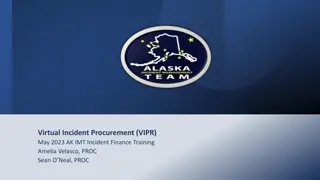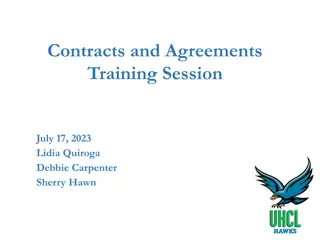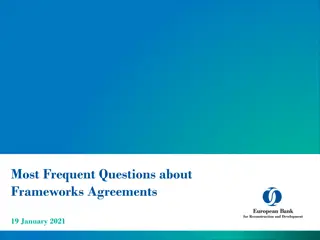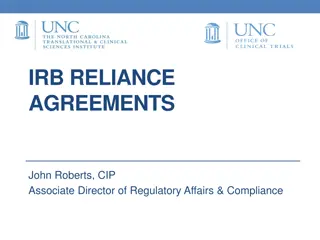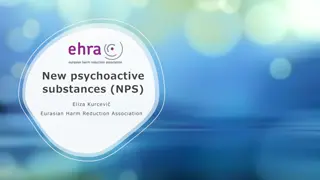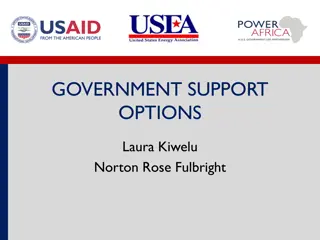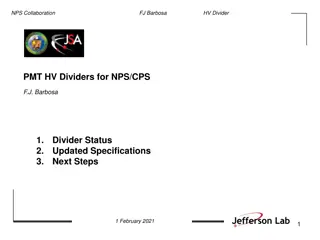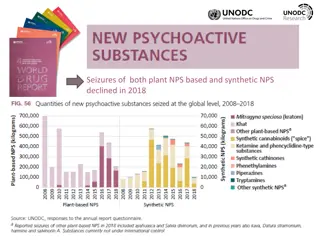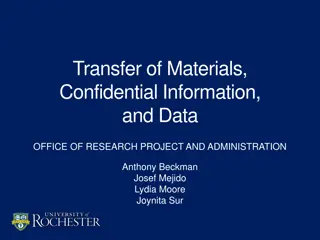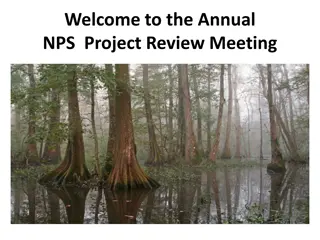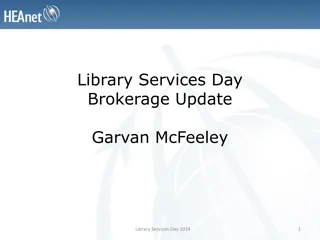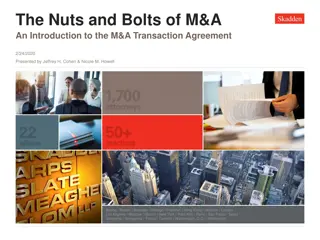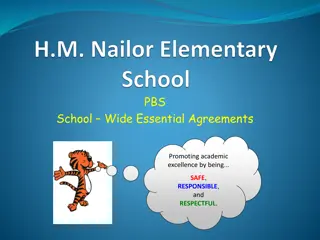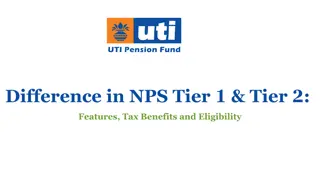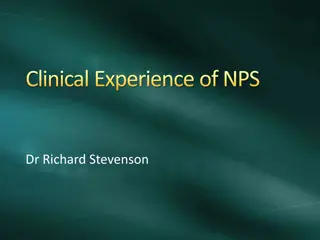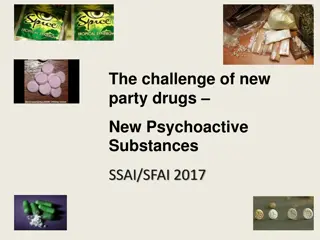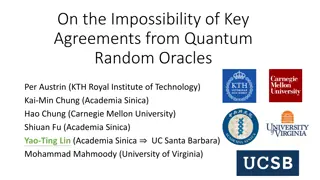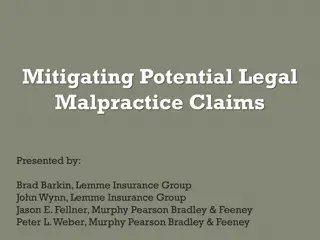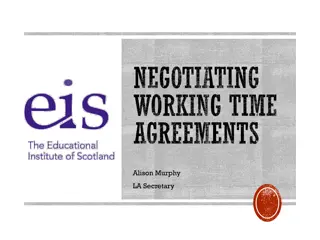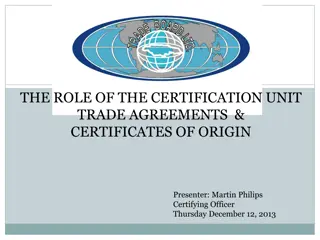Collaborative Research and Development Agreements (CRADAs) with NPS
CRADAs facilitate collaborative research between Federal laboratories like NPS and non-Federal entities to drive innovation. They define project tasks, protect intellectual property, and enable knowledge exchange to address Navy and DOD challenges. Through CRADAs, partners gain access to NPS expertise and technologies, fostering joint R&D efforts and innovation.
Download Presentation

Please find below an Image/Link to download the presentation.
The content on the website is provided AS IS for your information and personal use only. It may not be sold, licensed, or shared on other websites without obtaining consent from the author. Download presentation by click this link. If you encounter any issues during the download, it is possible that the publisher has removed the file from their server.
E N D
Presentation Transcript
HOW TO WORK WITH NPS Agata Maslowska Technology Transfer Specialist Office of Research & Innovation agata.maslowska@nps.edu 831-656-2270
Partnership with NPS A partnership with NPS provides access to expert faculty, operationally experienced military students and research with immediate applications within and outside the Department of the Navy and DOD. Partners gain understanding of challenges facing operational forces and how technology can provide potential solutions. Agreements that allow NPS to engage with Non-Federal partners include: Cooperative Research and Development Agreement (CRADA) Limited Purpose CRADA (LP-CRADA) Technical Services Agreement (TSA) Patent License Agreement (PLA) Education Partnership Agreement (EPA) 2
CRADA What is a CRADA? A CRADA is an agreement between a Federal laboratory and a Non-Federal party to perform collaborative research and development in any area that is consistent with the Federal laboratory s mission. CRADAs are a frequently used mechanism for formalizing interactions and partnerships between private industry and NPS, and the only mechanism for receiving funds from non-Federal sources for collaborative work. Both parties to a CRADA may provide personnel, facilities, equipment, or other resources, but the government may not provide funding to non-federal entities under a CRADA. CRADA projects are highly focused, and the specific technical responsibilities of the collaborators are delineated. A CRADA defines the tasks to be done within an area of collaboration and grants the Government a Government purpose license and the non- Federal party a non-exclusive, paid-up, royalty-free license for internal use of any inventions that result from the CRADA research. The Non-Federal party is granted an option to negotiate either an exclusive or nonexclusive commercial license within a pre- specified, CRADA-related field of use, subject to Government-purpose rights. The CRADA also provides protection of proprietary information for both sides. 3
CRADA When is a CRADA appropriate? CRADAs enable NPS researchers to exchange technical expertise with non- federal partners and protect the rights of both parties to inventions that may result from the collaboration. CRADAs are ideal mechanisms when NPS labs and an external partner can share resources and expertise not otherwise available to the other party to help advance development of an idea or technology that helps meet Department of the Navy (DON) needs. Who may participate in CRADAs? CRADAs must involve at least one Non-Federal party. In addition to NPS, the other participants in a CRADA may be one or more of the following: Large corporations (U.S. or foreign) Small business (U.S. or foreign) Colleges and universities (U.S. or foreign) State or local government An individual 4
CRADA Benefits of using CRADAs CRADAs provide NPS Labs and CRADA partners the opportunity to engage in joint R&D efforts and offer the following benefits: Access to NPS laboratories expertise, capabilities, and technologies to foster innovation. Access to NPS IP resulting from sponsored research activities. In the past 5 years, NPS has filed over sixty patent applications based on faculty and student research, many of which are in key technology areas such as additive manufacturing, advanced autonomous systems, space and cyberspace as warfighting domains, and resilient and agile logistics. There have been over 100 patents issued to NPS. 5
LP-CRADA WHAT is an LP-CRADA? LP- CRADA is a legal instrument that allows for an exchange of existing equipment/data/material between a Federal Lab and a Non-Federal entity (parties) for the recipient s purposes. The Provider provides equipment/data/material that the parties want evaluated or used by the Recipient. The Recipient conducts testing and evaluation as part of their own independent research and delivers a report of the results relevant to the Provider s equipment/data/material. Who may participate in LP-CRADAs? Non-Federal party or NPS can be the Provider or the Recipient. LP-CRADA Non- Federal Providers may be one of the following: Large corporations (U.S. or foreign) Small business (U.S. or foreign) Colleges and universities (U.S. or foreign) State or local government An individual 6
TSA WHAT is a TSA? A Technical Services Agreement (TSA), also known as Work for Private Party Agreement, allows a federal lab to provide its unique equipment and facilities for use by non-federal organizations when excess resources are available. These agreements should be used when there is no need for technical collaboration between NPS and the requesting entity. The entity requesting the laboratory s services must warrant that provision of the services will not constitute undue competition with the private sector and that that the services requested does not involve expansion of laboratory capabilities or facilities. Projects must be limited to providing testing and use of the facility. PI(s), budget, and period of performance are documented in the agreement. TSA non-federal partners may include an individual, partnership, corporation, association, state, local, or tribunal government, or an agency or instrumentality of the United States. Thus, the only limitation on participants is that they may not be agencies of foreign governments. 7
Patent License Agreement Patent License Agreement NPS has an extensive portfolio of over 100 patents covering important technological developments in a wide variety of scientific and engineering disciplines. Commercial Licenses are intended for partners who wish to manufacture and sell products in both private sector and government markets, or in solely private sector markets. NPS works closely with TechLink, a non-profit organization based at the University of Montana, that specializes in licensing and marketing technologies developed within DOD and VA labs nationwide, to promote NPS developed technologies available for licensing and further development. License Agreements can be: Non-exclusive, partially exclusive or exclusive. Each license agreement is individually negotiated between NPS and the prospective licensee. Navy licenses are subject to an irrevocable, royalty-free right of Government to practice the licensed invention. NPS technologies available for licensing can be found on TechLink s website 8
EPA WHAT is an EPA? EPAs are designed to encourage and enhance study in scientific disciplines at all educational levels. EPAs are appropriate for any educational institution or nonprofit which seeks to build or improve STEM educational and research capacity through partnership with NPS. Under an EPA NPS can provide assistance to the educational institution: Loan computer equipment or other scientific equipment as appropriate. Make laboratory personnel available to teach science courses or to assist in the development of science courses and materials for the institution. Provide sabbatical opportunities for faculty and internship opportunities for students. Involve faculty and students of the institution in defense laboratory projects, including research and T2 or transition projects. Cooperate with the institution in developing a program under which students may be given academic credit for work on defense laboratory projects. Provide academic and career advice and assistance to students of the institution. 9
Thank you Questions and comments Agata Maslowska agata.maslowska@nps.edu 831-656-2270 10

 undefined
undefined



